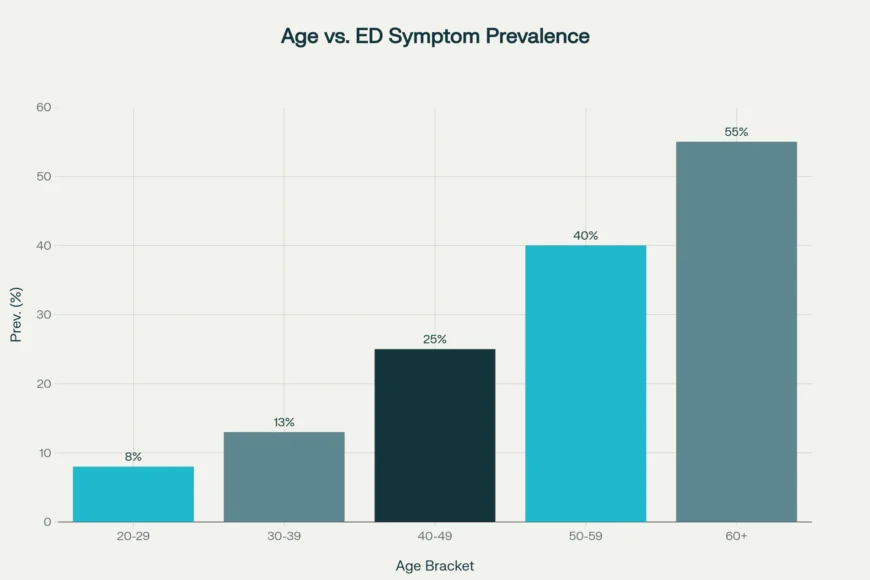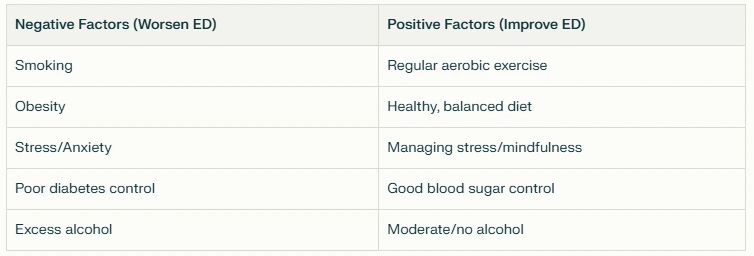Erectile Dysfunction Symptoms
Erectile dysfunction (ED) isn’t just a medical term—it’s a condition that millions of men live with, often silently. Today, I want to share everything you need to know about ED symptoms, how they present, and why recognizing them early is the key to taking control of your sexual health.
Introduction: Speaking Frankly About ED
Erectile dysfunction isn’t only about being unable to achieve an erection. The symptoms are nuanced, sometimes intermittent, and frequently misunderstood. As a urologist, I’ve seen firsthand how a discreet conversation can change a life. Let’s break the silence, strip away the stigma, and look at ED symptoms with clarity.
What Is Erectile Dysfunction?
ED is defined as the consistent difficulty obtaining or maintaining an erection firm enough for satisfactory sexual activity. It’s important to emphasize “consistent”—everyone has off days, but regular troubles indicate a deeper issue.
Recognizing the Symptoms of Erectile Dysfunction
Let’s start with the basics, then move toward the subtleties.
1. Difficulty Achieving an Erection
- What you notice: You initiate intimacy, but your penis doesn’t respond.
- Frequency: You experience this problem more often than not.
2. Trouble Maintaining an Erection
- What you notice: You can start strong, but lose firmness before completion.
- Context: Sometimes the erection is lost during intercourse, other times during foreplay.
3. Reduced Sexual Desire
- What you notice: It’s not just your body—your mind seems less interested.
- Details: Lower libido may be tied to emotional or hormonal factors but often coincides with ED.
4. Performance Anxiety and Mental Symptoms
- What you notice: Worry about performance becomes a self-fulfilling prophecy.
- Impact: Psychological symptoms may follow or precede physical symptoms.
5. Morning Erections Cease
- What you notice: You used to wake up with erections, but now they are rare or absent.
- Importance: Loss of spontaneous erections can be a red flag for underlying issues.
6. Weak or “Half” Erections
- What you notice: You’re able to get partially erect, but not firm enough for penetration.
Key Symptoms of Erectile Dysfunction
Here’s a summary chart to help track symptoms over time.
Underlying Causes Related to Symptoms
Sometimes ED symptoms are signals of something deeper than sexual health issues. Here are the most common physical and psychological culprits:
- Vascular Disease: Reduced blood flow is the number one cause.
- Diabetes: High blood sugar damages nerves and blood vessels.
- Hormonal Imbalances: Low testosterone or thyroid dysfunction.
- Neurological Disorders: Conditions like MS or spinal injuries can impact erections.
- Medication Side Effects: Some blood pressure, antidepressant, and prostate drugs have ED as a side effect.
- Depression/Anxiety: Mental health can dramatically affect sexual function.
How Do These Factors Change Symptoms?
The “flavor” of ED symptoms will differ according to the root cause. For example, vascular ED often presents with gradual symptom onset and diminished morning erections, while psychological ED may be more situational or fluctuating.
Differentiating ED From Other Sexual Issues
It’s easy to mistake ED for other problems:
- Premature Ejaculation: Can occur with or without ED.
- Low Libido: Sometimes caused by hormonal or relationship issues.
- Delayed Ejaculation: Not ED, but can overlap.
If you’re only having issues with climax or desire, it might not be ED.
When to Seek Help
You should reach out to a health professional if you experience:
- Symptoms for two months or longer
- Emotional distress due to sexual performance
- A sudden change in erectile ability
Real-Life Scenarios: Patient Cases
Case 1: The Middle-Aged Executive
John, 52, noticed he could no longer maintain an erection throughout intercourse. Occasional success became rare and morning erections faded. An assessment revealed that his blood pressure medication contributed to his symptoms.
Case 2: The Young Athlete
Mark, 28, had trouble achieving an erection after a stressful breakup, despite normal morning erections. The cause was psychological, not physical. Counseling helped restore function.
Case 3: The Diabetic
Carlos, 60, struggled with weak erections and reduced libido. His diabetes, poorly controlled, was damaging nerves and vessels vital for sexual health. Optimizing his blood sugar led to slow improvement.
Are ED Symptoms Always Obvious?
No—ED can present subtly with warning signs like decreasing firmness or an inability to “keep up” during longer sex sessions. Occasionally, men report harder erections when alone but trouble during partnered sex, hinting at performance anxiety.
Age and Prevalence of ED Symptoms
Let’s look at how symptoms appear by age:

| Age Bracket | Common Symptom | Estimated Prevalence |
| 20-29 | Psychological, situational ED | 8% |
| 30-39 | Fluctuating firmness; stress-induced | 13% |
| 40-49 | Gradual loss of erections | 25% |
| 50-59 | Consistently weak erections | 40% |
| 60+ | Multi-factor ED, hormonal/vascular | 55% |
Emotional Consequences
ED isn’t just physical. Common psychological symptoms include:
- Shame and embarrassment
- Relationship strain or avoidance
- Loss of self-confidence
It’s crucial to acknowledge that these are real and deserve attention, just like the physical symptoms.
What To Do If You Recognize ED Symptoms
- Document your symptoms: Use the chart above to track changes.
- Talk to your partner: Open communication can ease tension.
- Consult a professional: Testing may include blood work, hormone checks, and a physical exam.
- Lifestyle changes: Exercise, diet, and addressing underlying medical conditions help more than you’d think.
Factors That Worsen or Improve ED Symptoms

How Do Doctors Diagnose ED?
During a clinic visit, we focus on:
- History: How long, how often, how severe?
- Physical exam: Checking pulses, sensation, and genital health.
- Blood tests: Diabetes, cholesterol, testosterone.
- Questionnaires: The SHIM (Sexual Health Inventory for Men) is one tool I use to quantify symptoms.
When Are Symptoms Reversible?
If symptoms are linked to reversible factors (medication, stress, lifestyle), improvement is possible with interventions. Chronic diseases like severe diabetes or cardiovascular disease may require ongoing Erectile Dysfunction Treatment.
ED Can Signal Something Bigger
It’s critical to realize—ED can be an early symptom of serious conditions such as heart disease. Never ignore new sexual health symptoms; sometimes, these are your body’s warning signs.
The Value of Honest Discussion
Sharing symptoms openly with your healthcare provider gives you the best chance at recovery. Most men who seek help experience significant improvement—whether through lifestyle changes, counseling, or medication.
Final Thoughts: Your Next Steps
ED symptoms can sneak up unexpectedly or arrive suddenly. They are more than an inconvenience—they’re a sign that your overall health deserves attention. Don’t wait. Begin tracking your symptoms. Talk with your partner. See a doctor. Most importantly, know that you are not alone.
Key Takeaways
- ED symptoms include trouble achieving and maintaining erections, reduced libido, and loss of morning erections.
- Symptoms can stem from physical, psychological, or mixed Erectile Dysfunction Causes.
- Early recognition and intervention can make significant improvements.
- If symptoms persist for two months or affect your emotional well-being, seek medical advice.
FAQs
Can ED symptoms be temporary?
Yes. Many men experience occasional ED due to stress, fatigue, alcohol, or performance anxiety. However, if symptoms occur frequently or persist for more than a few weeks, it may indicate an underlying health issue.
How do I know if my ED is physical or psychological?
If erections occur normally during sleep or masturbation but not during sexual activity, the cause is often psychological (stress, anxiety, depression). If ED occurs in all situations, it may be linked to physical conditions like diabetes, heart disease, or nerve problems.
Are ED symptoms an early sign of other health problems?
Yes. Erectile dysfunction can be an early warning sign of cardiovascular disease, diabetes, hormonal imbalance, or high blood pressure. It’s important to consult a doctor if ED symptoms are persistent.
Is reduced libido a symptom of erectile dysfunction?
Not always. Low sex drive (libido) can be caused by hormonal imbalance, depression, or relationship issues. However, many men with ED also report reduced desire, so both conditions can overlap.
What tests are done to identify the cause of ED symptoms?
Doctors may recommend blood tests (to check hormones, cholesterol, diabetes), physical exams, ultrasound of penile blood flow, and psychological assessments to identify the root cause of ED symptoms.

Board-Certified Urologist | Male Reproductive Specialist | Associate Professor of Urology
Dr. Matt Coward is an ABMS board-certified urologist with over 10 years of experience and specialized expertise in male reproductive health and infertility. He currently serves as the Director of Male Reproductive Medicine and Surgery at UNC Fertility in Raleigh, North Carolina, and is the Fellowship Director of the UNC Men’s Health Fellowship.







